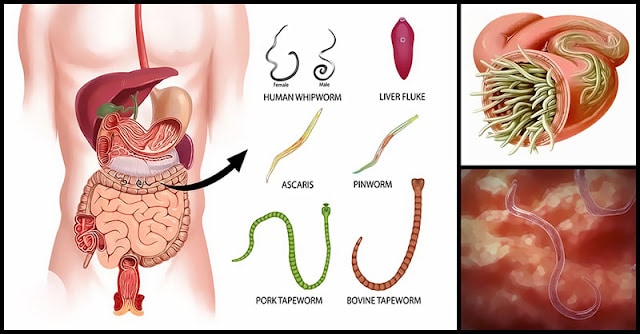Many people have parasites and are not even aware of it. It is common than you may think as anyone can get a parasitic infestation.
Parasites are microorganisms that live off other organisms. Some of them can directly cause disease. Other types of parasites can cause disease by the toxins that they produce. Some feed on red blood cells, some survive on the food you consume, and some even lay eggs inside your body.
They enter the body through the mouth or skin. There are several reasons wherein a person can get a parasite infestation and these include traveling to places that have parasite infestations, poor sanitation, a weak immune system, exposure to areas having parasites, intake of contaminated water or food, and poor hygiene.
Some of the common parasites that can infest your body are hookworms, tapeworms, pinworms, lamblia, dientamoeba fragilis, and Trichinella.
Here Are The Warning Signs That Your Body Is Full Of Parasites
Chronic Digestive Issues
Intestinal parasite infestation can cause inflammation and destroy the intestinal lining of the gut, thereby leading to chronic diarrhea.
Also, the toxic waste produced by the parasites can cause nausea, gas bloating, chronic constipation, and burning sensations in the stomach.
Consider a parasite cleanse if you are eating high fiber and highly alkaline foods on a daily basis and still experience diarrhea or other digestive issues.
Abdominal Pain
Parasites residing in the upper small intestinal region cause irritation and inflammation in this area, thus leading to a bloated feeling and pain in the abdomen.
Moreover, parasites can also cause pain in the upper abdominal region as it blocks the passage of waste products exiting the body.
Abdominal pain is mainly associated with roundworm, fluke, hookworm, tapeworm, or fluke intestinal infestations.
Anal Itching
Anal itching and discomfort are often experienced by those suffering from pinworms. Itching around the anus frequently occurs at night when the female pinworms lay their eggs and this can cause itching, crawling sensations or even acute pain.
The skin may break down and increase the risk of a secondary bacterial infection if the infected person scratches the area. Since itching usually occurs at night, this can lead to sleep disturbances and restlessness.
Consult your doctor if you have itching around the anus during the night for more than two weeks and without any sign of rashes.
Iron-Deficiency Anemia
The parasites steal the good vitamins, like iron, from the food the person eats, thus leading to an iron deficiency.
A child’s growth and development can be ultimately affected by severe anemia. In fact, slow growth and weight loss are common in children infected with parasites.
If you notice signs of slow growth in your child, consult your doctor.
Change In Appetite And Weight Loss
The presence of parasites in your body may be the cause of a sudden change in your appetite, particularly an increase in appetite.
In fact, an increased appetite combined along is often associated with tapeworm or pinworm infestation. Parasites consume a good amount of the food eaten by the infected person, thereby making the person hungry more often than usual and may never feel satisfied or full after eating a meal.
Fatigue And Weakness
Fatigue is mainly associated with intestinal worms that eat up the body’s vital nutrients by feeding on the food you eat.
Malabsorption of vitamins, fats, minerals, and carbohydrates can make the body weak, depressed, exhausted, and with a feeling of general apathy. It can lead to exhaustion of mental, emotional, and physical levels.
Skin Problems
Parasites that invade the intestinal tract cause inflammation in the body, which in turn causes several skin problems.
Some of the skin problems associated with this inflammation include hives, eczema, rashes, and other forms of skin allergies.
Moreover, waste products and toxins released by parasites can cause an increase in the eosinophils level in your blood, thereby leading to ulcers, sores, lesions, and swellings.
Aside from this, parasites can also lead to dry and brittle hair as well as hair loss.
Mental Distress
A parasite infestation can even cause depression, anxiety, mood swings, and also visual hallucinations. These symptoms are often paired with digestive issues.
Toxic metabolic waste produced by parasites residing in the intestine can attack neurons and neurotransmitters in the intestines, thereby causing restlessness, nervousness, depression, and mood swings.
Teeth Grinding
Parasite infestation is one of the possible causes of teeth grinding in your sleep.
Teeth grinding, also known as bruxism, occurs while sleeping due to restlessness and anxiety caused by waste and toxins released by the parasites in the body.
Among children, pathogenic parasites serve as the cause of bruxism. If you notice such symptoms in your children, get their stool examined.









